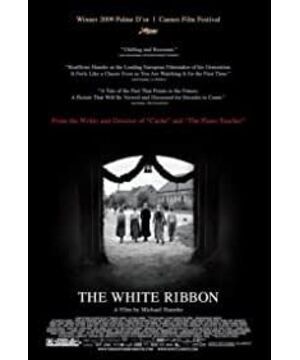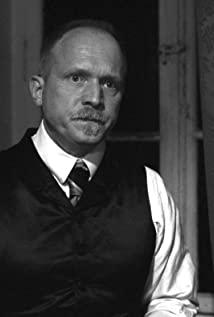"Fun Game" tells the story of two young people who hijacked a middle-class home and mutilated, insulted, and killed a family of three in a life-threatening game. Regardless of the meaning of Haneke's social irony (such as the tyrannical evil of the image itself), it is one of the focuses of the film to fully express the fun of violence. In this violent game, the two negative heroes most respect the authority of the rules of the game and the fairness of the game process. As for human life and morality, they are not within their consideration.
I think it is necessary to understand the deformity and evil of this kind of violence for a deeper understanding of the film "White Ribbon". Analyzed from the perspective of psychology, the fun of violence lies mainly in a strong sensory impact, which inspires the fear of death in people’s hearts, triggers people’s attacking instincts, stimulates adrenaline to soar, and at the same time gains absolute dominance. The psychological pleasure brought by the control and sabotage. It can be said that the taste of violence is one of the natural tastes that people use to affirm themselves.
In film and television works, the extreme development of the fun of violence is "violent aesthetics". Violent aesthetics emphasizes the formal beauty of violent behavior, and it mostly exists in a romantic, detached, and dreamy visual way. However, what Hanek shows in "White Ribbon" is another extreme of violent interest, a radically subverting the aesthetics of form, exposing the extreme that hides the deepest and most primitive violent tendency deep in the human heart.
One of the expressions of this subversion of the aesthetics of form is the long silence that deliberately deprives the background music of the uncomfortable silence, and the solemn black and white photography. In this black-and-white traditional German village, the orderly rural life was originally quiet and peaceful, but for unknown reasons, a series of disturbing violent incidents suddenly occurred: first, the village doctor riding a horse tripped over a rope. , Almost lost his life; then the young son of the largest landlord baron in the village was tortured and beaten; then some people took advantage of the harvest to secretly destroy the baron’s vegetable garden; the violence intensified, and eventually even spread to the burning of the barn and torturing the village. The mentally retarded son of the widow.
Another aspect of subverting the aesthetics of form is the incompleteness of the subject's narrative. The story adopts the personal perspective and memories of the country music teacher. Until the end of the film, there is no clear confirmation of who the murderers or the murderers of the series of violent incidents are. But exploring the specific murderer is not the key to the film. The focus of the rural teachers' fragmentary memories of these strange violent incidents is actually to reveal the living conditions of the people in this village trivially and delicately. And the center of this state is: depression.
One is dominant depression. This repression is represented by the pastor's family. The father with the dual nature of patriarchy and divine authority is the absolute authority in the family. He emphasizes absolute order. Children will be punished by corporal punishment when they return late, and the whole family will be hungry as punishment. He restrains children's behavior with guilt. The children who grew up in this family, to prevent masturbation, boys sleep with their hands tied, girls are publicly humiliated because they speak loudly; white ribbons symbolizing purity are sewn on their arms, but vicious grass of resistance grows inch by inch. , Caught all the gaps and retaliated wildly. Only in the destruction can they regain control and affirmation of their bodies and behaviors. The original violent taste has become the only and only pleasure in life. This is just as the writer Liu Yu said in the film review "The Possibility of Happiness", "When a person is deprived of the right to pursue happiness, the suffering of others becomes his happiness."
The other is implicit depression, represented by widows and baron’s wives. These two women are at an absolute disadvantage in their respective relationships between men and women. The former is rudely abandoned, while the latter voluntarily flees, but still suffers humiliation and contempt. Neither of these two directly resisted their oppressors to vent the pressure like the children of the pastor’s house. Instead, they took a forbearing attitude and unconsciously transferred the pressure from themselves to the next generation, from the widow’s fan of the baron’s butler’s son. A slap in the face, complaints about the doctor’s son, and the baron’s wife's impatience to blame the eldest son, the transmission of violence is faintly visible.
Regardless of whether it is explicit or implicit, the violent tendency derived from psychological repression has an inertia similar to the signs of obsessive-compulsive disorder. Once the psychological pleasure is developed, it is very difficult to quit. This violent tendency is also group and inductive, and it is often not limited to one's independent behavior. It often spreads out and spreads to others through bad demonstration effects.
In a healthy society that is functioning normally, the violent tastes in personality are usually suppressed, and at most it is relieved by means of virtual entertainment such as film and television works and video games. But if a person’s real life is in a state of coherent depression, the violent interest in the heart will be like a volcanic eruption, until the right port erupts violently, resulting in cases of violence; and if a society is in a state of depression for a long time Whether it’s universal class repression or targeted group repression, the evil interest of violence will seize every opportunity to spread arbitrarily. Violent cases finally evolve into a collective violent mentality, which develops to the extreme in repression, and even forms. The perverted worship of violence blooms the evil flowers of fascism.
Liu Yu believes that freedom is the only way to happiness, but I think the proposition of "freedom" is a bit too broad, because absolute freedom without restriction does not exist, and freedom without specific restrictions is only one step away from freedom. . As far as the elimination of violence is concerned, the role of freedom is actually a shifting role, which relieves people’s violent tastes in other forms, or gives people sufficient choices to defeat the tastes of violence with a more constructive taste. Starting from the allegorical German village in "White Ribbon", to fight against group violence, freedom means a democratic society, and the hope of freedom is bred in the pastor’s young son’s understanding of responsibility and desire. , Conceived in the sincere love and respect of the rural teachers to their fiancée.
But even in a democratic society, the transfer of liberty to violence is temporary and incomplete. In some corners neglected by society, violent crime is still rampant, and it is a deep-rooted acne under the surface. But if we want to completely eliminate the evil interest of violence, it can only be done through the fundamental negation of human nature, as Kubrick showed in the movie "A Clockwork Orange" or Huxley in the novel "Brave New World". This behavior is a kind of violence in itself, a great social violence that transcends personal petty violence.
[Juvenile Crime Series]
"Lake of Eden": The Origin of Violence
http://aixiaoke.blog.163.com/blog/static/115553544201022024116893/
"Harry Brown": Using Violence to Control Violence
http://aixiaoke.blog .163.com/blog/static/11555354420102210544740/
"White Ribbon": Development of Violence
http://aixiaoke.blog.163.com/blog/static/11555354420102242429780/
"Nobody Knows ": Black River
http:/ /aixiaoke.blog.163.com/blog/static/11555354420103294019829/
"The Forgotten": The Forgotten Class
http://aixiaoke.blog.163.com/blog/static/11555354420103691734721/
View more about The White Ribbon reviews











